Career
Nursing



Created to support new students with exceptional first attempt entrance exam scores (83 on the HESI or 66 on the TEASV), this grant is available to BSN or LVN to BSN students starting March 2026 at WCU-Texas. Learn more.
For additional information and eligibility requirements on the New Student Achievement Grant, please visit the Undergraduate On-Ground Scholarships and Grants page on our catalog.Earn your BSN in as few as 39 months at the Accelerated program pace
New, innovative campus with the latest industry technology
Learn through immersive simulation exercises and hands-on clinical experiences
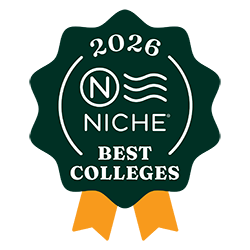
Best Colleges for Nursing in America
Best Colleges for Nursing in Texas
Best Value Colleges in the Dallas-Fort Worth Area
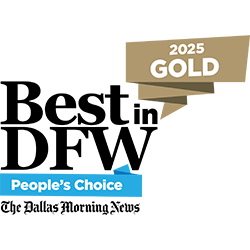
WCU is a gold award recipient in the Education category in the Dallas Morning News!

WCU-Texas has been voted Best College or University in the Best of Dallas 2025 hosted by the Dallas Observer!
No waitlist, so you can start your degree now and begin making a difference sooner
Immersive simulation labs where you can master hands-on skills confidently
Career-ready preparation including NCLEX prep and support
Diverse clinical partners in the Dallas metro where you can gain real-life experience
WCU-Texas is ranked #1 Best College for Nursing in America out of 780 schools, #1 in Texas out of 44, and #1 Best Value College in the Dallas-Fort Worth Area by Niche.
Texas is a hub for healthcare innovation and offers numerous opportunities for nursing professionals. With major hospitals, research institutions, and healthcare facilities in the Dallas-Fort Worth metroplex, WCU-Texas students will have access to a range of clinical experiences while in school and career opportunities upon graduation.
By pursuing a BSN at WCU-Texas, you can practice and master your skills in technologically advanced simulation labs and prepare to make a difference in your community. The diverse and supportive community at WCU-Texas helps ensure that you receive a forward-thinking education that prepares you for the dynamic and evolving field of nursing.
Nursing is a hands-on profession. That’s why our nursing programs at WCU-Texas are designed to give you opportunities to practice your skills in our simulation labs. Take a virtual tour to get a sneak peek at your nursing education.
For Debbie Lee S., balancing the demands of nursing school while raising children was no small feat. As a full-time student and full-time mom, Debbie Lee brought a level of maturity and resilience to her studies that helped her stand out in a competitive field.
Our simulation center at WCU – Texas is technologically advanced, providing students with the technology they would experience in a hospital or in any medical care facility. It provides them with the opportunity to make mistakes and to learn and grow in a safe, supportive environment.
With no waitlist you can start your degree now and begin making a difference sooner. Earn your BSN at WCU in Texas.
Learn why you should choose West Coast University Texas to further your healthcare education!
WCU-Texas offers a BSN program that you can complete in 39 months at an accelerated pace. With no waitlists and real-world simulation labs, the Dallas-area program provides students with a more streamlined path to earning their BSN degree.
On-Campus
120 Credits
39 Months
8 Semesters
This curriculum applies to students matriculating or reentering after December 1, 2022.
All science courses must have been taken within the last five calendar years, unless the student possesses a degree or advanced degree in the specific field of study for which the student is seeking transfer credit. Additional information regarding transfer credit is located in the university’s catalog under Transfer Credit policy or below.
| Category and Requirements | WCU Course Requirements | Transferable / Options |
|---|---|---|
| Foundational Course | FYS 001 (0): First Year Seminar (only offered at Los Angeles and Ontario prior to Spring II 2024)
FHE 100 (3): Foundations of Higher Education (offered at all Campuses; Los Angeles and Ontario Campuses starting Spring II 2024) |
Non-transferable |
| A. Written Communication (6 Semester Credits) | * ENGL 140 (3): Written Communication I * ENGL 240 (3): Written Communication II |
Equivalent to ENGL 140 Equivalent to ENGL 240 |
| B. Oral and Interpersonal Communications (3 Semester Credits) |
*SPCH 142(3): Oral Communication | Equivalent to SPCH 142 |
| C. Critical Thinking and Ethical Reasoning (3 Semester Credits) |
*PHIL 341(3): Critical Reasoning | Equivalent to PHIL 341 |
| D. Quantitative Literacy (6 Semester Credits) |
MATH 108(3): College Mathematics I MATH 211(3): Statistics |
Equivalent to MATH 108
Equivalent to MATH 211 |
| E. Social and Behavioral Sciences Awareness (6 Semester Credits) |
*PSYC 160(3): Psychology *PSYC 290(3): Life Span Psychology |
Equivalent to PSYC 160 Equivalent to PSYC 290 |
| F. Historical, Cultural, and Aesthetic Recognition (3 Semester Credits) |
* HUM 370 (3): Cultural Pluralism | Equivalent to HUM 370 |
| G. Scientific Reasoning (16 Semester Credits) |
|
|
| General Education Capstone (3 Semester Credits) |
CAPS 401(3): General Education Capstone (only offered at Los Angeles, Ontario Campuses prior to Spring II 2024) |
Non-transferable |
| A minimum of 46 credits is required for graduation. | ||
| General Education within the Area of Study | ||
| PATH 370 | Pathophysiology | 3 |
| PHIL 434 | Medical Ethics and Issues | 3 |
| Total Credit Hours: | 6 | |
| Core Nursing Courses | ||
| NURS 100 | Fundamentals of Nursing | 3 |
| NURS 101L | Fundamentals of Nursing Skills Lab | 2 |
| NURS 110 | Introduction to Professional Nursing | 2 |
| NURS 120 | Introduction to Medical Surgical Nursing | 3 |
| NURS 121L-A | Introduction to Medical Surgical Nursing Practicum | 2 |
| NURS 121L-B | Introduction to Medical Surgical Nursing Practicum – On-Campus | 1 |
| NURS 180 | Pharmacology | 3 |
| NURS 190 | Physical Assessment | 2 |
| NURS 201 | Medical Surgical Nursing-Promoting Wellness | 3 |
| NURS 211L | Medical Surgical Nursing | 3 |
| NURS 222 | Mental Health/Psychiatric Nursing: Promoting Wellness in the Mentally Ill | 3 |
| NURS 223L | Mental Health/Psychiatric Nursing: Promoting Wellness Practicum | 2 |
| NURS 225 | Nutrition in Health and Disease | 3 |
| NURS 306 | Expanding Family and Community (OB) | 2 |
| NURS 307 | Developing Family and Community (PEDS) | 2 |
| NURS 316L-A | Expanding and Developing Family and Community Practicum (OB) | 1.5 |
| NURS 317L-A | Developing Family and Community Practicum (PEDS) | 1.5 |
| NURS 340 | Public Health Nursing | 3 |
| NURS 342L | Public Health Nursing Practicum | 2 |
| NURS 350 | Research in Nursing | 3 |
| NURS 420 | Principles of Leadership and Management | 3 |
| NURS 431 | Disaster Management | 2 |
| NURS 440 | Issues and Trends in Nursing | 3 |
| NURS 480 | Advanced Medical Surgical Nursing: Promoting Wellness Practicum | 3 |
| NURS 481L | Advanced Medical Surgical Nursing: Promoting Wellness Practicum | 3 |
| NURS 493* | Integration of Nursing Concepts | 3 |
| NURS 497 | Nursing Capstone | 1 |
| NURS 498L | Integration of Nursing Practices | 3 |
| Total Credit Hours: | 68.0 | |
| Program Credit Distribution | ||
| General Education Semester Credits | 46.0 | |
| General Education within the Area of Study | 6.0 | |
| Core Nursing Courses | 68.0 | |
| Total Program Semester Credits | 120.0 | |
We know school is a substantial commitment. At WCU, we want to equip you with all the information you need to make the right decision for your future.
Our goal is to give you a clear understanding of Bachelor of Science in Nursing tuition costs so you can be well-informed as you navigate the application and enrollment process. To assist you in your decision, we provide a breakdown below of the Bachelor of Science in Nursing program costs at West Coast University.
We offer several financial aid options — including scholarships, grants, and loan access — to help support you through your studies. For more information about your financial support options, visit our Financial Aid page.
Estimated Cost of Attendance is comprised of both direct costs and indirect costs, as outlined in the charts below. The purpose of the Cost of Attendance (COA) is to provide students and families with an estimated cost to attend West Coast University. The COA includes both direct and indirect cost estimates and are categorized as follows: (1) Direct costs are paid directly to West Coast University and are shown separately for each program; (2) Indirect costs are not paid to West Coast University and are estimates students may use to budget expenses they may incur while attending school. While actual indirect costs may vary, West Coast University estimates these amounts based on the number of months in an academic year and whether students will live with parents or off campus.
Direct Costs
| Degree Type | Bachelor of Science
(Starting Fall I 2024) |
Bachelor of Science
(Starting Fall II 2024) |
| Total Program Credits | 120 | 120 |
| Program Length | 8 semesters | 8 semesters |
| Full-Time Status (12 to 18 credits) | $12,930 | $10,100 |
| 3/4-Time Status (9 to 11 credits) | $10,750 | $8,397 |
| 1/2-Time Status (6 to 8 credits) | $8,405 | $6,565 |
| Less than 1/2-Time Status (under 6 credits) (per credit) | $1,425 | $1,111 |
| Total Tuition Cost (Full-Time) | $103,440 | $80,800 |
| Registration Fee (refundable) | $75 | $75 |
| Estimated Total Book Costs1 | $5,333 | $5,333 |
| Estimated Total Book Shipping Cost1 | $533 | $533 |
| Estimate for Uniforms Fee1 | $250 | $250 |
| Estimate for Supplies & Licensure Preparation Fees1 | $2,345 | $2,345 |
| Technology Fee2 ($100 per semester) | $800 | $800 |
| General Education Resource Fee3 | $500 | $500 |
| Core Nursing Fee4 | $22,640 | |
| Estimated Total Program Costs | $113,276 | $113,276 |
Indirect Costs
| 10 Month Academic Year5 | ||||
| Prior to Fall I 2025 | Starting Fall I 2025 | |||
| with parents | off campus | with parents | off campus | |
| Federal Student Loan Fees | $100 | $100 | $100 | $100 |
| Course Materials (Personal Electronic Device-1st year only) | $1,000 | $1,000 | $1,000 | $1,000 |
| Living Expenses (Food & Housing) | $3,120 | $10,410 | $3,270 | $10,910 |
| Transportation | $2,160 | $2,160 | $2,220 | $2,220 |
| Miscellaneous Personal Expenses | $7,070 | $7,070 | $7,070 | $7,070 |
| Total | $13,450 | $20,740 | $13,660 | $21,300 |
*Upon enrollment, students select Accelerated or Evening and Weekend, which will determine the pace at which students complete their degree. In most cases, students that select Accelerated will attempt two courses per term, and students that select Working Professional will attempt one course per term.
1 The Estimated Book, Uniform and Supply fees reflect the Manufacturers Suggested Retail Price totals compiled in December 2024 and are subject to change.
2 Technology Fee includes student technical support, Office 365, blended and online course delivery/learning management system, mobile app, student portal technology and access, and require electronic course materials/software.
3 The General Education Resource Fee includes costs associated with lab supplies and materials, Labster virtual labs and simulations, and Tutor.com access.
4 The Core Nursing Fee will be billed each semester in which Core Nursing courses are scheduled and covers costs associated with background checks and drug screenings; the operation of equipment for Simulation, Technology, including but not limited to the establishment, scheduling, coordination, site visits, on-going management, and other expenses related to clinical activities. 5 Core Nursing Semesters multiplied by $4,528 per Core Nursing Semester.
Note 1: Students who wish to take Challenge Exams will be subject to a fee of $100 for each Challenge exam. Please see the campus Bursar Office for a full price listing.
Note 2: Course Audit Policy – Students auditing a course are not charged tuition or fees for the audited course. However, if a student enrolls in both an audit course and a credit-bearing course in the same semester/trimester, they will be responsible for the tuition and applicable fees associated with the credit-bearing course.
Note 3: The Total Tuition Cost can be converted to Cost per Credit Hour by using the following calculation:
Total Tuition Cost ($103,440 prior to Fall II 2024 or $80,800 starting Fall II 2024) divided by the Total Program Credits (120) = Cost per Credit Hour ($862 prior to Fall II 2024 or $674 starting Fall II 2024).
Direct Costs
| Degree Type | Bachelor of Science (Program Start Date Prior to Fall II 2024) |
Bachelor of Science (Program Start Date On or After Fall II 2024) |
| Total Program Credits | 120 | 120 |
| Program Length | 8 semesters | 8 semesters |
| Full-Time Status (12 to 18 credits) | $12,930 | $10,100 |
| 3/4-Time Status (9 to 11 credits) | $10,750 | $8,397 |
| 1/2-Time Status (6 to 8 credits) | $8,405 | $6,565 |
| Less than 1/2-Time Status (under 6 credits) (per credit) | $1,425 | $1,111 |
| Total Tuition Cost (Full-Time) | $103,440 | $80,800 |
| Registration Fee (refundable) | $75 | $75 |
| Estimated Total Book Costs1 | $4,285 | $4,285 |
| Estimated Total Book Shipping Cost1 | $429 | $429 |
| Estimate for Uniforms Fee1 | $250 | $250 |
| Estimate for Supplies & Licensure Preparation Fees1 | $4,200 | $4,200 |
| Technology Fee2 ($100 per semester) | $800 | $800 |
| General Education Resource Fee3 | $500 | $500 |
| Core Nursing Fee4 | $22,640 | |
| Estimated Total Program Costs | $113,979 | $113,979 |
Indirect Costs
| 10 Month Academic Year5 | ||||
| Prior to Fall I 2025 | Starting Fall I 2025 | |||
| with parents | off campus | with parents | off campus | |
| Federal Student Loan Fees | $100 | $100 | $100 | $100 |
| Course Materials (Personal Electronic Device-1st year only) | $1,000 | $1,000 | $1,000 | $1,000 |
| Living Expenses (Food & Housing) | $3,120 | $10,410 | $3,270 | $10,910 |
| Transportation | $2,160 | $2,160 | $2,220 | $2,220 |
| Miscellaneous Personal Expenses | $7,070 | $7,070 | $7,070 | $7,070 |
| Total | $13,450 | $20,740 | $13,660 | $21,300 |
*Upon enrollment, students select Accelerated or Evening and Weekend, which will determine the pace at which students complete their degree. In most cases, students that select Accelerated will attempt two courses per term, and students that select Working Professional will attempt one course per term.
1 The Estimated Book, Uniform and Supply fees reflect the Manufacturers Suggested Retail Price totals compiled in December 2024 and are subject to change.
2 Technology Fee includes student technical support, Office 365, blended and online course delivery/learning management system, mobile app, student portal technology and access, and require electronic course materials/software.
3 The General Education Resource Fee includes costs associated with lab supplies and materials, Labster virtual labs and simulations, and Tutor.com access.
4 The Core Nursing Fee will be billed each semester in which Core Nursing courses are scheduled and covers costs associated with background checks and drug screenings; the operation of equipment for Simulation, Technology, including but not limited to the establishment, scheduling, coordination, site visits, on-going management, and other expenses related to clinical activities. 5 Core Nursing Semesters multiplied by $4,528 per Core Nursing Semester.
Note 1: Students who wish to take Challenge Exams will be subject to a fee of $100 for each Challenge exam. Please see the campus Bursar Office for a full price listing.
Note 2: Course Audit Policy – Students auditing a course are not charged tuition or fees for the audited course. However, if a student enrolls in both an audit course and a credit-bearing course in the same semester/trimester, they will be responsible for the tuition and applicable fees associated with the credit-bearing course.
Note 3: The Total Tuition Cost can be converted to Cost per Credit Hour by using the following calculation:
Total Tuition Cost ($103,440 prior to Fall II 2024 or $80,800 starting Fall II 2024) divided by the Total Program Credits (120) = Cost per Credit Hour ($862 prior to Fall II 2024 or $674 starting Fall II 2024).
For Admissibility into the BSN & LVN/LPN to BSN Program, Applicants Must Meet the Following Requirements:
Pre-Licensure Nursing Requirements prior to clinical assignments (ADN, BSN & LPN to BSN):
BSN and LVN/LPN-BSN applicants requesting transfer credit evaluation must provide official transcripts by the Add/Drop deadline on the second Tuesday of the term. All general education, prerequisite, and core nursing coursework must have been taken at an appropriately accredited institution. For nursing credits to be considered for transfer credit, there can be only one year between the end of the last nursing course taken at a previous institution and the beginning of the first course at West Coast University. Exceptions may be considered. Science courses must be taken within the last five years to be accepted for transfer credit. Course syllabi for courses previously taken at another nursing program should be submitted for review to the campus dean for nursing. The maximum allowable transfer credits applied to the BSN program shall not exceed 52 credits of general education, and for the ADN (Florida only) program shall not exceed 27 credits of general education. See the Challenge Credit policy for additional information on receiving nursing credit for previously completed nursing courses. Authority for all final transfer credit decisions is given to the Program Dean/Chair.
Transfer credit will not be awarded based on unofficial transcripts, however, students may be scheduled for their first semester of courses based on unofficial transfer credit review . Financial packaging for the first semester will be estimated without transfer credit unless/until official transcripts are received and evaluated. If transfer credit is evaluated after the add/drop date of the first semester, it will be reflected in financial aid offers for the subsequent semester.
Individuals who are concurrently enrolled at another institution at the time of their matriculation to West Coast University, may be allowed to request transfer credit for courses that are in-progress. In this situation, official transcripts must be received by the end of the first term of matriculation in order to receive transfer credit.
All applicants who are veterans or seeking transfer credit must submit all official applicable postsecondary transcripts by the Add/Drop deadline on the second Tuesday of the term regardless of applicable transfer credits for timely certification of the veterans request for benefits and receipt of funds. Please see the Veterans Educational Benefits policy in the Financial Policies and Information Section of the Catalog.
To receive transfer credit for this program, previous General Education course must have achieve a grade of at least a “C”, and Core courses require a minimum grade of a “C+”. Approval on transfer credit is based on the program’s discretion.
For additional information, visit our catalog.
Richild Berrick, PhD, MSN/Ed, RN
Campus Dean of Nursing
B.S., Nursing – University of Phoenix
M.S., Nursing /Ed– University Of Phoenix
PhD, Nursing Education– Nova Southeastern University
Brenna Nix, MHA
Campus Associate Director of Nursing, Administration
M.S., Healthcare Administration – Texas Tech University, Health Sciences Center
B.S., Healthcare Management – Texas Tech University, Health Sciences Center
Yolanda Jones, FNP-C, MSN, RN
Campus Associate Dean of Nursing, Academics
M.S.N., Family Nurse Practitioner – Walden University
B.S., Nursing – Delta State University
A.S., Nursing – Trinity Valley Community College
Jimmy Gonzales, MBA
Campus Associate Dean of Nursing, Clinical Education
M.B.A. – New England College of Business and Finance
B.S., Microbiology – Texas Tech University
Allison Bass, MSN, RN
Manager, Skills Lab Education
B.S., Nursing – University of Kentucky
M.S., Nursing – Indiana Wesleyan University
Amber Casselberry, MSN, RN, CMSRN
Instructor I
M.S., Nursing Education – University of Texas, Tyler
B.S., Nursing – Texas A&M University, Commerce
Danielyan, Maria MSN, RN, CCRN
Manager, Clinical Faculty
B.S., Nursing – University of Phoenix
M.S., Nursing – University of Phoenix
Furlough, Shenee, MSN-Ed, RN, CMSRN
Manager, Simulation Education
M.S.N., Nursing Education – University of Texas, Arlington
B.S., Nursing – University of Texas, Arlington
Janet Godbold, MSN, RN
Instructor II
M.S., Nursing Education – Western Governors University
B.S., Nursing – Texas Christian University
B.A.A., Accounting – Harding University
Peter Hoang, MSN, RN, PCCN-K
Instructor II
M.S., Nursing Education – University of Texas at Arlington
B.S., Nursing – Texas Women’s University
A.D., Nursing – North Central Texas College
Donna Kundaje, MSN, BSN, RN
Instructor II
M.S., Nursing – St. Joseph College of Maine
B.S., Nursing – University of Connecticut
Ellen Lloyd, MSN, RN
Instructor I
M.S., Nursing – Chamberlain School of Nursing
B.S., Nursing – Chamberlain School of Nursing
A.S., Nursing – El Centro College, Dallas
Amber Molubhoy, MSN-Ed, RN, CPHON
Instructor I
M.S.N., Nursing Education – New York University
B.S., Nursing – Baylor University
Julie Ramus, DNP, FNP-BC
Instructor I
DNP, FNP – University of Michigan, Ann Arbor
B.S., Nursing – Oakland University
B.A., Public Policy – University of Michigan, Ann Arbor
Avneet Ridings, MSN, RN, CCRN
Instructor I
M.S., Nursing – Texas Tech University Health Sciences Center
B.S., Nursing – University of Texas Health Sciences Center
B.S., Biology – University of Texas at Dallas
Jessica Robinson, MSN, RNC-OB
Instructor I
M.S., Nursing Education – Grand Canyon University
B.S., Nursing – University of Texas, Arlington
Emily Roe, MSN, RN
Manager, Persistence and Outcomes
B.S., Nursing – California Baptist University
M.S., Nursing – Capella University
Shelby Santangelo, MSN, RN
Instructor I
M.S., Nursing Education – Western Governors University
B.S., Nursing– University of Hartford
A.S., Science – Middlesex Community College
Diploma, Nursing – Ona M. Wilcox College of Nursing
New academic terms begin, on average, every 10 weeks. To get an idea of when each term starts and ends, view our Academic Calendar.
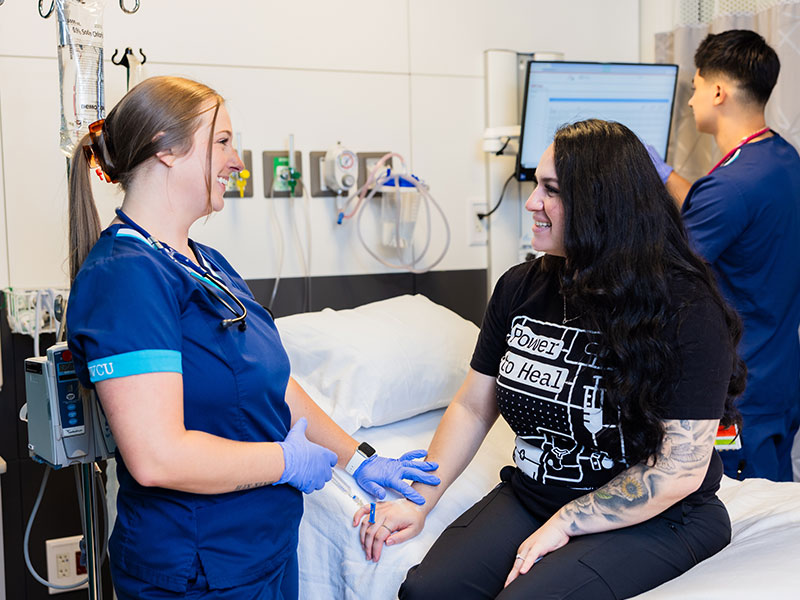
According to the U.S. Bureau of Labor Statistics, Texas is the second highest employer of registered nurses (RNs). The Dallas-Fort Worth-Arlington metro, specifically, has the fourth highest employment level of RNs among other U.S. metropolitan areas.
Pursuing your BSN degree in Texas can empower you to make a meaningful difference in the health of individuals and communities.
If you’re looking for a nursing school in Texas that emphasizes hands-on learning, the WCU-Texas BSN program offers technologically advanced simulation labs equipped with industry-current technology. Practice your skills using manikins that mimic real-life patients. Their blood pressure rises and falls, their pupils dilate, and they show signs of pain. In the simulation labs, students learn what to do when a patient crashes, and they gain the confidence to tackle real-world challenges.
The simulation labs are equipped for a variety of scenarios, including in the following areas:
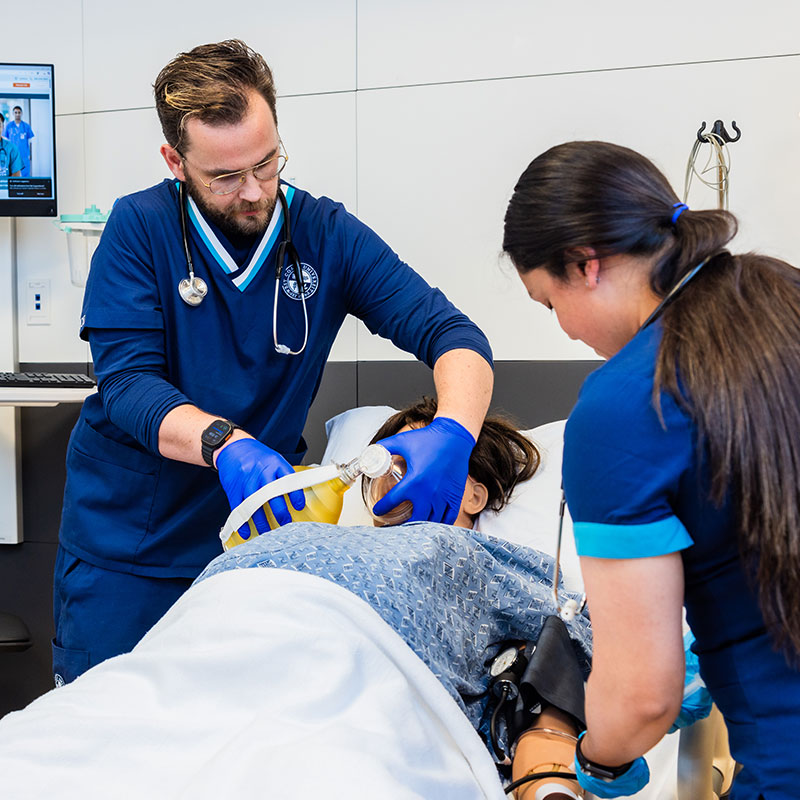
Not only do sim lab instructors provide guidance on patient care, they also double as voice actors, helping students gain valuable hands-on experience through realistic scenarios. Take a behind-the-scenes look at how WCU brings sim lab training to life!

We’ve asked our students, alumni, and advisors about their favorite activities and places in Texas. Check out their answers and start picturing what your life could look like when you study here!

At WCU-Texas, we know real-life experience is pivotal in helping you become a confident nursing professional. Our dedicated Clinical Placements team is available to help you find a local healthcare facility that fits your goals. They can facilitate clinical site and preceptor selection, help streamline approvals, and assist with compliance tracking.
After passing all your classes and completing your clinical hours, there’s still one more step to becoming a registered nurse: passing the licensure exam.
WCU-Texas brings you the support you need to prepare for the NCLEX-RN. You’ll have access to NCLEX advisors, bootcamps, study guides, and no-cost tutoring. Through these tools and resources, you’ll gain an understanding of topics covered and the types of questions asked in the exam.
“The day we graduated, I was like ‘I’m going to go take my NCLEX tomorrow.’ That’s how prepared I felt.”
– Alexis C., BSN ’20*
“Because I felt so confident after the program, I actually went back and rescheduled my exam to take it earlier and, thankfully, I passed on the first try.”
– Radha D., BSN ’20*
WCU-Texas graduates have access to our Career Services team for every step of their job search.1 Get help with career planning, locating open jobs, writing resumes, completing applications, and preparing for interviews.
Registered nurses can work in a variety of healthcare facilities. According to the U.S. Bureau of Labor Statistics, RNs most commonly work in the following settings:
Additionally, RNs can also work in departments and facilities with a range of specializations, including addiction treatment, cardiovascular care, critical care, genetics, neonatal care, nephrology, and public health.2 Our Career Services department can help you find a role that fits your long-term career goals.
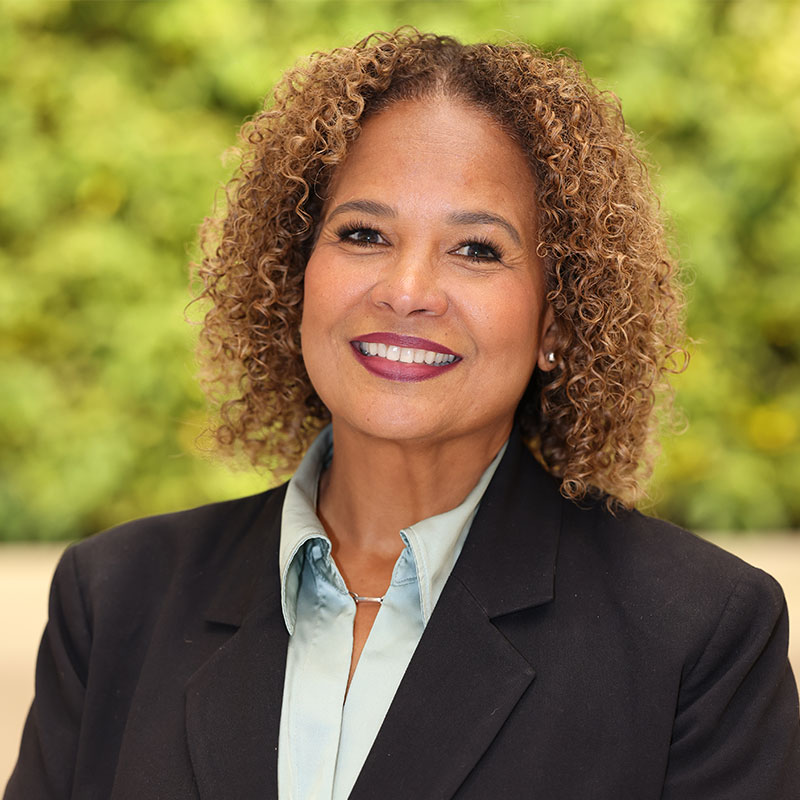
Richild Berrick is the Campus Dean of Nursing at West Coast University-Texas. In her current role, she specializes in NCLEX preparation, curriculum development and management, teaching methodology, and assessment development and analysis.
Dr. Berrick is a certified nurse educator with 17 years of experience in nurse education, during which time she worked in both public and private schools. She was licensed as an RN in 1994, and her clinical experience includes nursing in labor and delivery, emergency room, critical care settings.
Dr. Berrick has a PhD in Nursing Education, a Master of Science in Nursing with an emphasis in nursing education (MSN/Ed), and a Bachelor of Science in Nursing. When she is not working, she enjoys traveling, attending music festivals, and doing anything outdoors.

Brenna Nix is the Campus Associate Dean of Nursing and Administration for West Coast University’s Texas campus. Prior to assuming the associate dean role, Nix was a Program Assistant for Clinical Education for WCU-Texas. She has nearly a decade of administrative experience.
Some of Nix’s duties as an associate dean include assisting with training and onboarding of new faculty members, maintaining the nursing program budget, and overseeing federal work-study students and program assistants.
Nix has a Master of Science in Healthcare Administration and a Bachelor of Science in Healthcare Management from Texas Tech University. She is a member of the American College of Healthcare Executives.
In her free time, Nix loves traveling and spending time with her family. She also enjoys finding new coffee shops to visit.
The BSN program at WCU-Texas allows you to complete your degree in 39 months (a little over 3 years).
Yes. WCU’s BSN program is for any students who are seeking to become a registered nurse (RN), even those who have already obtained a bachelor’s degree in a different area of study.
West Coast University offers various master’s programs for BSN graduates who want to continue their educations. One popular option is our Master of Science in Nursing program, which allows you to specialize in a specific area of nursing. We offer advanced practice registered nurse (APRN) specialties such as our Family Nurse Practitioner track, as well as non-APRN specialties such as our Nurse Leader and Nurse Educator tracks.
We also have an RN to MSN program available for those pursuing their graduate degree post-licensure. Non-nursing graduate degrees that some of our nursing students pursue include our Master of Health Administration, Master of Business Administration, and Master of Public Health programs.
An RN is a state-granted license that lets you work as a registered nurse. A Bachelor of Science in Nursing (BSN) is an academic degree from an accredited institution. A BSN helps prepare you to pass your RN licensure exam, but it is not a requirement for licensure. Many nurses choose to pursue their BSN because it helps prepare them for new career opportunities. According to the American Association of Colleges of Nursing (AACN), 77.4% of employers are expressing a strong preference for BSN program graduates.5
Financial aid and scholarships are available for those who qualify. At WCU-Texas, we have a dedicated team of financial aid advisors to help guide you through the process and find the solution that is right for you. For more information about institutional scholarships available at WCU-Texas, such as the Greg Jarvis Simulation Scholarship and the Nursing Excellence Grant, please visit the Undergraduate On-Ground Scholarships and Grants page on our online catalog.
West Coast University
2323 N. Central Expressway, Suite 100
Richardson, TX 75080
(214) 453-4533
Pursuing your degree is a big choice. Fill out our form and one of our admissions advisors will contact you to answer any questions you may have!
1 WCU provides career guidance and assistance but cannot guarantee employment.
2 Bureau of Labor Statistics, U.S. Department of Labor, Occupational Outlook Handbook, Registered Nurses, “Work Environment,”
*The views and opinions expressed are those of the individuals and do not necessarily reflect the beliefs or position of the school or of any instructor or student.
Financial aid and scholarships are available for those who qualify.